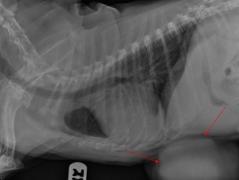Breast Cancer Awareness for Pets

Breast Cancer Awareness for Pets
October is National Breast Cancer Awareness Month. Our physicians are recommending we perform self-examinations and undergo screening mammography. But what about our dogs and cats? Do dogs and cats get breast cancer? What can you do to help protect your pet?
Cats, Dogs and Women are a Lot Alike
There are many similarities between breast cancer in us and our pets. Females are much more likely to develop the disease than males, although male cats, dogs and humans definitely can develop breast cancer.
About half the dogs with breast cancer are cured by surgical removal of the tumor, and surgery cures many women as well. For advanced breast cancer in women, dogs and cats, chemotherapy and radiation therapy are treatments used following surgical removal of the tumor.
There are Some Differences
Cats are not as lucky as dogs when it comes to breast cancer. Even with a radical mastectomy, which in a cat consists of removal of all the breast tissue on one side, cats are rarely cured. Surgery successfully removes the tumor, but metastasis is the killer. Sites of metastasis are similar to those in women with invasive forms of breast cancer: lungs and bones.
Some women have breast tumors with estrogen receptors located on the tumor. The presence of these receptors indicates the tumor requires estrogen for growth. Drugs to block the receptor have been developed and can successfully be used to treat women who have this type of tumor. Estrogen receptors are sometimes found on benign dog and cat tumors, but the malignant tumors seem not to require estrogen for growth, and veterinary oncologists don’t use antiestrogen therapies very often.
Women who delay child bearing until late in life have a greater risk of developing breast cancer than women who have children young. Reproductive status impacts the development of breast cancer in dogs and cats somewhat differently than in humans. Early spaying dramatically decreases the risk of developing breast cancer in dogs and in cats.
Nearly all my feline patients with breast cancer are foundlings who come to their new homes unspayed and often pregnant. Those cats with a good home from the start, and spayed at 6 months of age, don’t usually become breast cancer patients.
What Can an Owner Do?
The first part is easy. Spay your female dog or cat early. Typically this means about 6 months of age, but how early depends on your veterinarian. If you adopt a shelter pet, it may have already been spayed at a young age. Waiting until after their first heat decreases the protective benefit of spaying early, but if you get your pet at an older age, spaying will still help prevent breast cancer.
Monitor your pet. The dog shown in the x-ray to the left has a giant breast tumor someone has been ignoring. Fortunately, the x-ray shows the tumor hasn’t spread to the lungs.
If you give daily belly rubs, it will be easy to find any breast lumps early. Have any lump in the breast area evaluated by your veterinarian. Don’t ignore lumps – on your pet or on yourself.
Photos: Courtesy of The AMC
________________________________________________________
This may also be found in the “Tales from the Pet Clinic” blog on WebMD.com.
For over a century, The Animal Medical Center has been a national leader in animal health care, known for its expertise, innovation and success in providing routine, specialty and emergency medical care for companion animals. Thanks in part to the enduring generosity of donors, The AMC is also known for its outstanding teaching, research and compassionate community funds. Please help us to continue these efforts. Send your contribution to: The Animal Medical Center, 510 East 62nd Street, New York, NY 10065. For more information, visit www.amcny.org. To make an appointment, please call 212.838.7053.


































